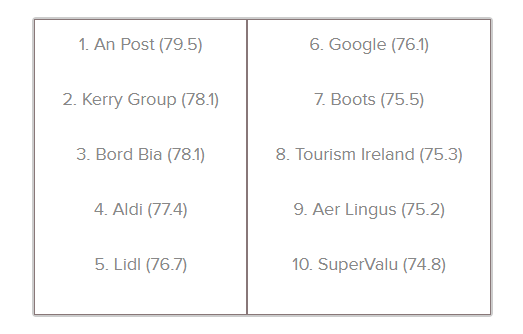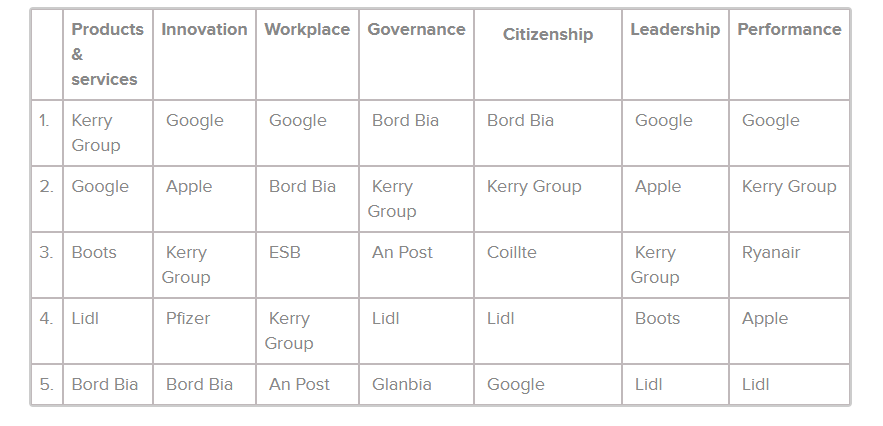
An Post, Kerry Group and Bord Bia Top Ireland RepTrak 2017 Study of the Most Highly Regarded Organisations In Ireland
An Post, Kerry Group and Bord Bia top the Ireland RepTrak 2017 study of the most highly regarded organisations in Ireland
Consumers ten times more likely to buy products from companies with an excellent reputation than from those with a poor reputation.
Corporate governance has a greater impact on reputation than ever before.
The Reputations Agency today announced the results of the annual Ireland RepTrak® 2017 study. Based on the perceptions of more than 4,500 respondents who completed the survey in the first quarter of 2017, the survey quantifies the emotional bond stakeholders have with 50 leading companies, and how these connections drive supportive behaviour such as a willingness to purchase a company’s products, recommend the brand, invest, welcome into their community or even work for the company.
Companies are ranked on a Reputation Pulse score from 0-100 based on levels of Trust, Esteem, Admiration, and good Feeling towards the companies, and are grouped as Excellent (80+), Strong (70-79), Average (60-69), Weak (40-59) or Poor (Below 40).
The top 10 companies in the Ireland RepTrak® 2017 study are:

For the second year in succession indigenous Irish organisations occupy the top three places in the Ireland Reptrak® study. 20% of the firms studied improved their scores significantly this year (by over 3.7 points) whilst only 10% significantly declined. Overall, the public feels more positive about firms this year than last year, when 27% of firms’ reputations significantly declined. This year's average reputation Pulse score is 64.4.
The biggest movers
The following companies have seen the largest improvements from 2016 to 2017:
eir (+8.3 points)
Kerry Group (+ 6.1 points)
Apple (+5.4 points)
AIB (+ 5.3 points)
Irish Distillers (+ 4.9 points)
Ranking by Industry – Consumer Goods Remain on Top
When looking at industry reputations, the Food & Beverage sector remains the most highly regarded, while the financial services sector is the weakest with an 18-point difference in reputation scores across sectors. The Financial Services Insurance sector score fell by 3 points amid rising premiums and general consumer dissatisfaction, while the Financial Service Banks sector showed signs of recovery this year, increasing by + 2.25 points.
The nine sectors studied in 2017 were ranked as follows:
The Food & Beverage sector (72.20 – Strong)
Retail Food sector (70.4 - Strong)
Healthcare (69.2 - Average)
Airlines & Aerospace (68.8 - Average)
Semi-States (65.7- Average)
Energy (65.1 - Average)
Communications (61.1 - Average)
Financial – Insurance (59.8 - Weak)
Financial – Banks (54.5 - Weak)
Reputation drives support and business results
The research shows that reputation substantially drives business results by increasing the propensity to buy, recommend, trust, invest, work for, or welcome companies into the community.
According to Niamh Boyle, Managing Director, The Reputations Agency: “Organisational leaders value the RepTrak® study as it provides a real insight on consumers’ perception of the reputational standings of Ireland’s top companies and this matters to them given the clear link between a strong reputation and performance indicators such as sales and profitability.
From this year’s study, we can see that consumers in Ireland are ten times more likely to purchase a product or service from a company and seven times more likely to work for a company with an excellent reputation than a company with a poor reputation. 85% of people in Ireland would say something positive about a company with an excellent reputation, while only 7% would do the same for a company with a poor reputation.
It is no surprise, therefore, those leading companies are investing in measuring reputation and managing reputation as a valuable asset in a systematic way to support delivery of organisational goals.”
Corporate governance and citizenship as key drivers of reputation
The study found that while Products & Services has the largest impact on corporate reputation with a weighting or importance level of 20%, Corporate Governance (perceptions of fairness, ethics and transparency) has increased significance to a weighting of 18.4% in 2017 from 16.3% in 2016, while perceptions of Citizenship have also increased to a weighting of 15.8% from 14.7% in 2016. These are followed in importance by perceptions of an organisations Leadership (13.2%), Workplace (11.3%), Innovation (11.3%) and Performance (10%).
“The results show us that people wish to be treated with authenticity, transparency, decency and fairness by the companies they are spending their money with. So much is invested by companies in promoting their products & services, when in fact what people really want to know about is the company behind these products. Companies need to invest far more in telling their corporate story in order to build a stronger emotional bond with the public and move the large proportion of fence sitters who really don’t understand the company, to become positive supporters of the company,” says Niamh Boyle.
Top five companies across the seven dimensions that drive reputation
Top performing companies tend to perform well across all dimensions of reputation as they carefully manage their reputation. Just 12 companies hold the top five positions across the seven dimensions that drive an organisation’s reputation. Kerry Group appears in all seven of the top five positions, while Google appears in six and both Lidl and Bord Bia appear in five.

